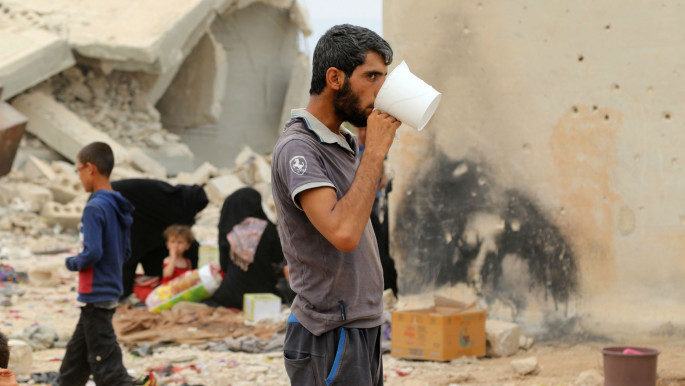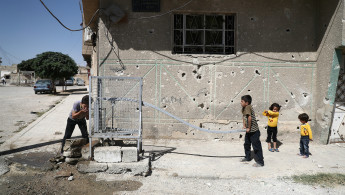Dreaming of a hot shower in Syria's war-torn Aleppo
"We dream of taking a warm shower," begins Aleppo resident Umm Ahmad.
She is one of the millions in the war-torn Syrian city who have been left without water as fighting intensifies.
Instead, residents of Aleppo have resorted to bathing, drinking and washing clothes with highly contaminated well water after being left without access to running water through the public network.
Last month, intense attacks damaged the Bab al-Nayrab water pumping station which supplies water to the estimated 300,000 people currently residing in besieged rebel-held east Aleppo. Violence in the area has prevented repair teams from reaching the station.
Another pumping station, the Suleiman al-Halabi station, also located in the east of the city, was then switched off "in retaliation", cutting water to the one and a half million people located in the regime-controlled west of the city.
"Every morning, my children fetch water from the well. I store it in bottles, pots and the bath tub. Making the water fit to drink is a real problem," continues Umm Ahmad.
"Every day I have to filter the water and boil it to cook with. Despite all that, my husband and one of my children have contracted Typhoid fever."
 |
Every morning, my children fetch water from the well. I store it in bottles, pots and the bath tub. Making the water fit to drink is a real problem |  |
 |
|
| Aleppo is now at the heart of a major military campaign [Getty] |
Speaking to Lubna Salem, a The New Arab Syria correspondent, Umm Ahmad shares the plight surrounding the basic need and fundamental right of clean water in the country.
"Taking a warm shower has become a dream. Water used to come for an hour or two every five days. We would leave everything and all take showers one-by-one, racing against time.
"Now we wash up with the smallest amount of well water possible and perform our prayer ablutions with even less," the Old Aleppo resident added.
Aleppo, once Syria's vibrant commercial powerhouse, is now at the heart of a major military campaign by President Bashar al-Assad's fighters and his steadfast ally Russia.
Maha, who lives in government-controlled west Aleppo, said that her home has had no running water for more than three weeks.
"We have gone back 100 years in the past; we now use water from the well. I have to devote an entire day now to cleaning clothes. I send my children out to collect water, which is gruelling work and takes hours. I then use as little water as possible to wash an entire household's worth of clothes."
 |
We have gone back 100 years in the past; we now use water from the well |  |
With the city now relying on underground wells for water supplies, the spread of disease from unclean water has become a major worry for locals.
"Our biggest concern is waterborne diseases. We know water in the east of the city is quite contaminated, more than in the west. We are on the verge of catastrophe," said Juliette Touma, UNICEF's regional chief of communications for the Middle East and North Africa, speaking to The New Arab.
In particular, Touma said that a lack of access to clean water could lead to the spread of health conditions including diarrhoea, scabies, and hepatitis.
"This is not a new thing. It has been happening in Aleppo for a year, children are most vulnerable," continued Touma.
Another resident of the divided city, Abu Omar, explained that after dealing with constant power and water cuts he took matters into his own hands.
"Me and the neighbours have dug a well in our building's courtyard and I bought a generator to pump the water. Unfortunately, the water isn't clean so I only use it to bathe and clean. I buy bottled water; it is very expensive but I can afford it, however, most people cannot," he said.



